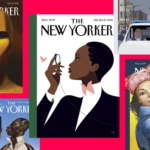
As many saw in Oscar-winning short film Hair Love, black hair is beautiful, but it’s also notoriously difficult to manage. One of the first hair memories Naza founder and CEO Natanya Montgomery has is of her mom brushing her hair into three afro puffs on the top of her head. When she was seven, she started coming to terms with the state of her hair, and that’s when her mom took her to the salon for the first time. She’s been going to the salon about every month for the last 18 years.
“I’ve never been delighted,” she said.
Same. I have memories of my mom separating my hair into three giant braids and sending me off to school. I ended up going to the salon for the first time in 3rd grade, and it was a painstakingly long experience — between the stylist not being able to start on time to the treatment itself taking hours. One time I spent 17 hours in a salon getting my hair braided, but that’s another story for another time.
These are the types of experiences just about every young black or brown girl goes through at some point in their lives. And it’s what led Montgomery to launch Naza Beauty, which is opening up its first location in San Francisco this week following a $1 million funding round led by Initialized Capital.
At its most basic level, it’s like Drybar but for women of color. The main similarity with Drybar is its menu of styles that it can do in a specific amount of time.
Naza Beauty’s menu features five protective styles with 25 variations. These styles include braids, twists, sew-in extensions, blowouts and crochet styles — all of which can be perfected in four hours or less. Naza Beauty does not do any hair cuts, coloring or any chemical treatments.
On the tech side, Naza’s software functions as a booking and payments platform, which also learns the styles of each customer and then makes product recommendations.
But there’s more to it than that, Montgomery said.
“We are reimagining the end-to-end beauty experience for black and brown women starting at the salon,” she said.
In addition to a high-end, software-powered salon, Naza Beauty develops its own products geared toward people with coily, kinky and afro hair. Through Naza Labs, thousands of black and brown women over the country can serve as active product development customers who get to test and review the products. Right now, up to 10,000 people can request to join the community to help co-create products from idea stage to testing.
“We center this type of hair in a world where our hair is usually an afterthought,” she said. “For people with self-proclaimed difficult hair, a lot of products that come out for everyone ignores people at the tightest end of the texture spectrum.”
That’s part of what led Montgomery to open the company’s first location in San Francisco. Despite the city’s dwindling black population, there is a history of blackness in the city, she said.
“It was really important for me to make space for blackness in San Francisco again,” she said. “Also, the black women who are here are really looking for a solution to this problem.”
Naza Beauty comes at a time when states are introducing bills to ban discrimination of black hairstyles. In Colorado, the state Senate introduced the Creating a Respectful and Open World (CROWN) Act to provide protection to people who may experience discrimination due to their hairstyles. Last week, Washington state and Minnesota passed and introduced, respectively, similar legislation.
“More and more people are seeing that these styles are valid, real and beautiful,” she said. “A lot of times women with textured hairs are made to feel ashamed when they go into the salon setting or even out into the world. We’re creating community around valuing coily, kinky and afro hair.”






